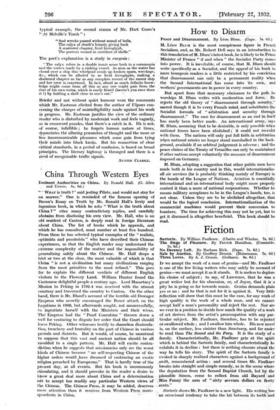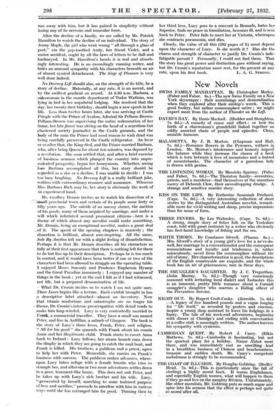Fiction
3s. 6d. )
No Decency Left. By Barbara Rich. (Cape. 7s. 6d.) Is we accept the work of a man of genius—and Mr. Faulkner is one of the few living writers who may safely be accused of genius—we must accept it as it stands. It is useless to deplore his choice, of subject ; to say, of Lawrence, that he was a great writer but for his obsession, or, of Joyce, that it is a pity he is going so far towards music. Genius demands plain yes or no : and he that is not for it is against it. Very little reflection will show that this must be the case, for any work of high quality is the work of a whole man, and we cannot accept half a man's personality and reject the rest. Nor ate we ever in a position to decide how much the quality of a work of art derives from the artist's preoccupation with any par- ticular subject. Mr. Faulkner, therefore, has to be rejected or swallowed whole ; and I swallow him whole. His new novel is, on the surface, less sinister than Sanctuary, and far easier to read than The Sound and the Fury. it is the study of a family. Characteristically, Mr. Faulkner gets at the spirit which is behind the Sartoris family, and characteristically he exhibits it in decline : but there is nothing obscure about the way he tells his story. The spirit of the Sartoris family is • evoked in sharply realized characters against a background of „swift, remembered action : and several_ times Mr. Faulkner breaks into straight and simple comedy, as in the scene where the deputation from the Second Baptist Church, led by the plausible Simon, come to collect from old Bayard and ..Miss Fanny the sum of " sixty sevvum dollars en fawty _cents."
Sartoris shows Mr. Faulkner in a new light. His writing has an occasional tendency to take the bit between its teeth iind
run away with him, but it has gained in simplicity without losing any of its nervous and muscular force.
After the decline of a family, we are called by Mr. Patrick Hamilton to watch the decline of an individual. The story of Jenny Maple, the girl who went wrong " all through a glass of port," via the gap-toothed Andy, her friend Violet, and a motor accident, ought by all the laws of letters to be dull and hackneyed. In Mr. Hamilton's hands it is real and absorb- ingly interesting. He is an exceedingly cunning writer, and hides an unusual sympathy with his characters beneath an air of almost cynical detachment. The Siege of Pleasure is very well done indeed.
No Decency Left should also, on the strength of its title, be a story of decline. Materially, at any rate, it is an ascent, and by the swiftest gradient on record. At 0.80 a.m. Barbara, a saleswoman in the mantle department of Tudor Watkins, was lying in bed in her unpalatial lodging. She resolved that the day, her twenty-first birthday, should begin a new epoch in her life. Less than. twelve hours later, she was arriving at Castle Pringle with the Prince of Avalon, Admiral Sir Pelham Brown- l'elham-Brown was superVising the entire redecoration- of her home, her late fiance- was sitting on the head of a scurrilous but chastened society journalist in the Castle grounds, and the body of the man the Prince had most reason to wish dead was being carefully preserved in the Castle refrigerathr. An hour or so after that, the King died, and the Prince married Barbara, who, after being Queen for about ten minutes, was deposed by a revolution. She soon settled that, and after a brief exercise of business acumen which plunged the country into unpre- cedented prosperity, began her honeymoon. Whether; seeing Theav Barbara accomplished all this, her story should he regarded as a rise or a decline, I was unable to decide : I was too busy laughing. No Decency Left is a really brilliant joke, written with extraordinary resource and assurance. Whoever Miss Barbara Rich may be, her story is obviously the work of an experienced hand.
Mr. Geoffrey Dennis invites us to watch his dissection of a
!":"--.1.11.1all provincial town and certain of its people some forty or fifty years ago. The suicide of an uneasy sinner, the auction of his goods, many of them acquired by marriage, and under a will which infuriated several prominent citizens—here is a theme of which almost any novelist could make something. Mr. Dennis, being an exceptional novelist, makes a great deal
...of it. The speed of the opening chapters is masterly ; the dissection is brilliant, almost awe-inspiring. All the same, Sale By Auction left me with a slight feeling of dissatisfaction. Perhaps it is that Mr. Dennis describes all his characters so fully at their first appearance that there is nothing left for them to do but live up to their description. Perhaps he is too much In control, and it would have been better if one or two of the characters had been allowed to struggle on the operating table. I enjoyed Moses Smeanly and Prudence Euphemia Hyssop and the Great Paradine immensely ; I enjoyed any number of things in the book ; yet at the end I felt as if I had witnessed, not life, but a prepared demonstration of life.
What Dr. Cronin invites us to watch I am not quite sure. Tlfree Loves begins like a lecture. Each exhibit brought in has a descriptive label attached—almost an inventory. Now that titanic misfortune and catastrophe are no longer his - theme, Dr. Cronin's intense preoccupation with detail tends to make him long-winded. Lucy is very contentedly married to Frank, a commercial traveller. They have a small son named Peter, and live in Ardfillan, a suburb of Glasgow: The book is the story of Lucy's three loves, Frank, Peter, and religion. All for his good " she quarrels with Frank about his cousin Anna and her illegitimate child. Frank starts to escort Anna back to Ireland : Lucy follows, her steam launch runs down the dinghy in which they are going to catch the mail boat, and Frank is killed. His brothers, a publican and a priest, agree to help her with Peter. Meanwhile, she carries on Frank'S business with success. The publican makes advances, where- upon Lucy takes refuge with a female lunatic who tries to
strangle her, and after one or two more adventures settles doWn in a poor, tenement-like home. This does not suit Peter, and he takes up with Lucy's rich brother and his wife. Lucy; ".persecuted by herself, marching to some tortured purpose of love and sacrifice," proceeds to interfere with him in various. ways until she has estranged him for good.' Turning then to
her third love, Lucy goes to a convent in Brussels, hates her Superion finds no peace in hundliation, becomes ill, and is sent ;back to Peter. Peter fails to meet her at Victoria, whereupon she contracts pneumonia, and dies.
Clearly, the value of all this (592 pages of it) must depend upon the character of Lucy. Is she worth itY Has she the charm and strength of character to justify Dr. Cronin's inde- fatigable pursuit ? Personally, I could not find them. That the story has great power and distinction goes without saying, but Dr. Cronin's reputation must rest, for the present at any



































 Previous page
Previous page